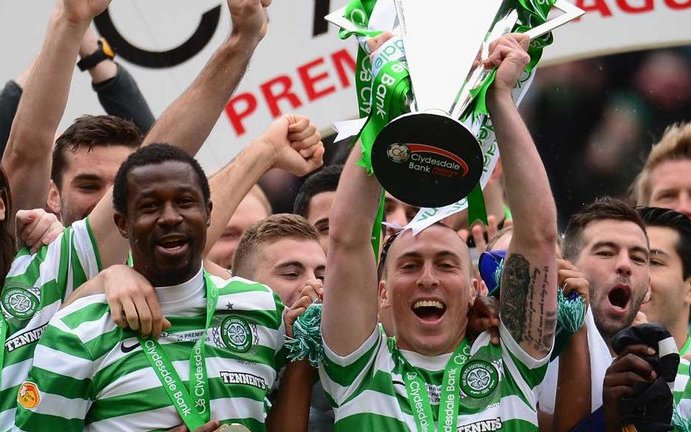Anyone with even a basic knowledge of the Titanic knows at least one simple fact about icebergs; what you see on the surface is rarely the full picture.
A seemingly tiny and obscure lump of frozen rock floating on the surface may in fact mask a colossal mass lurking just below, posing dangers to the unaware.
Celtic’s achievements this season – like the visible section of the iceberg – are obvious.
2017-18 has brought with it a seventh league triumph in a row, a League Cup win as well as a Champions League run culminating in post-Christmas European football.
And of course the Scottish Cup Final brings with it the possibility of the completion of an unprecedented double treble.
Regardless of Saturday’s score there is no question that Celtic are enjoying a period of phenomenal success; Brendan Rodgers’ appointment has sparked domination not seen since the days of Jock Stein.
This is clearly cause for celebration. As a season ticket holder since the early 1990s – and someone with a good memory – there is no prospect of my taking these achievements for granted.
And yet for Celtic the problem is not what it is visible and observable, rather it is what lies beneath the surface.
Unlike the swashbuckling and dynamic achievements of 2016-2017, this season – for all its clear successes – has felt very stuttering at times.
Once you ignore the headline trophies – important though they are – the statistics tell another, hidden story. And one that poses challenges for next season.
No club in Scotland has drawn more home games than Celtic (seven in total), and points have been dropped in 42% of all home games.
Those people claiming that Celtic’s defeat to Aberdeen on the final day was part of an elaborate conspiracy clearly have not paid attention to the club’s general league form at Parkhead.
Away games are slightly better, although points were still dropped in 31% of games. Overall this means that points have been lost in more than one third of all league games.
When it comes to league goals, Celtic are not the top scorers in Scotland either home or away (instead it is Hibs and Sevco, respectively).
Even Europe was a catalogue of contradictions. An outstanding away win against Anderlecht, contrasts with the disappointment of the return game, and chastening defeats versus PSG.
In itself none of this is a huge disaster, and especially not when compared to the aforementioned early 1990s. Sport necessitates challenge and uncertainty, meaning points will be dropped and games lost.
But as Brendan Rodgers looks forward to his third season in charge, he must know that changes are needed. Aberdeen will seek to strengthen this summer, as well as a resurgent Hibs.
Sevco under Gerrard are also sure to be stronger. In spite of the catastrophes that have befallen the Ibrox club, they still reached two semi-finals and finished third, giving them a foundation for progress.
And of course Celtic’s gaze is not simply drawn towards Scotland’s borders; for Rodgers to be considered a true legend in the Stein mould then he must make a mark in Europe.
Champions League glory is of course a fantasy, but providing a better organised and stronger challenge to the top teams should not be out of the question. And Europa League progress should also be possible.
When the club has excelled in Scotland then it has emphasised the gulf which exists with other teams. But at other times this season’s successes have felt more laboured than achieved with any style or panache.
Whilst iceberg danger is not always obvious, there can be clues such as shadows in surrounding water. Celtic should consider the hints of recent games, especially versus Kilmarnock, Aberdeen and Hibs.
The team often has a major lack of pace when given the chance to break, which can kill the chance of a goal. In addition there is an increasing inability to open up a well-organised and packed defence.
Celtic’s defence itself is another problem.
Of all the many centre halves we have, there is no obvious leader and first choice pick, each option demonstrating strengths and limitations.
At full back – aside from the star of Kieran Tierney – the club is not blessed with strength in depth. Lustig – having been a wonderful servant – is surely approaching the end of his first pick time.
In theory the club’s three strikers (Dembele, Edouard and Griffiths) are the best in Scotland but injuries – and uncertainty about them remaining – undermine their effectiveness.
And elsewhere in the squad some of last year’s stars and standouts – notably Scott Sinclair – have almost dropped off the radar of relevance, even though Sinclair remains the club’s top scorer.
As the Titanic steamed towards the USA, icebergs in sight but at a seemingly safe distance, its owners rejoiced in their achievement of building such a wonderful and ‘unsinkable’ ship.
So on Saturday it is to be hoped that the day will mark a stunning and extraordinary double treble achievement – one that should then be rightly and loudly celebrated.
But perhaps giving at least some thought to what possibly lies beneath – and next season – would do no harm either.
Matthew Marr is a blogger and Celtic fan from Glasgow. He hopes our club is aware of hidden dangers.
